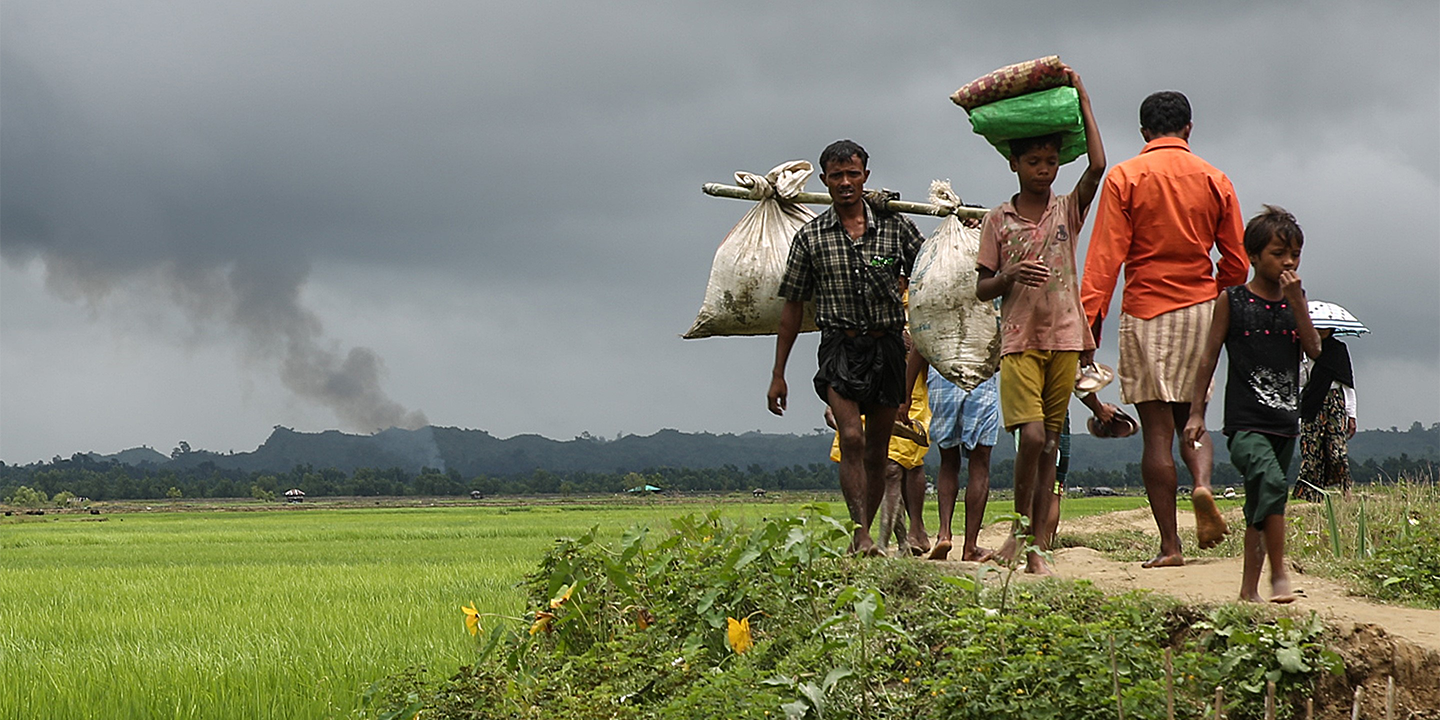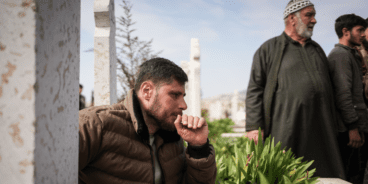

Atrocity Alert No. 420: Myanmar (Burma), Syria and Forced Labor
Atrocity Alert is a weekly publication by the Global Centre for the Responsibility to Protect highlighting situations where populations are at risk of, or are enduring, mass atrocity crimes.
ICC SEEKS ARREST WARRANT FOR MYANMAR’S GENERAL MIN AUNG HLAING
In a landmark step toward justice for Myanmar’s (Burma) Rohingya population, the Chief Prosecutor of the International Criminal Court (ICC) announced on 27 November a request for an arrest warrant for Senior General and Acting President and Commander in Chief, Min Aung Hlaing. Chief Prosecutor Karim Khan alleges that General Hlaing bears criminal responsibility for the crimes against humanity of deportation and persecution of the Rohingya, committed in Myanmar and in part in Bangladesh between August and December 2017. The alleged crimes were committed by Myanmar’s armed forces, with support from “the national police, border guard police and non-Rohingya civilians.” The Chief Prosecutor noted that while this is the first request for a warrant against a senior official, “more will follow.”
Although Myanmar is not a state party to the ICC’s Rome Statute, in November 2019 the ICC prosecutor opened an investigation into alleged crimes against the Rohingya that were committed, at least in part, in Bangladesh, an ICC member country. A UN Fact-Finding Mission has determined that General Hlaing, and his top military leaders, should be prosecuted for genocide against the Rohingya and for crimes against humanity and war crimes in Kachin, Rakhine and Shan states. No one has yet been held accountable for these crimes. The International Court of Justice (ICJ) is currently hearing a case brought by The Gambia against Myanmar, supported by seven other countries, for alleged violations of the Genocide Convention. In January 2020 the ICJ imposed provisional measures requiring Myanmar to prevent genocidal acts, to ensure that the military and police forces do not commit acts of genocide, to preserve evidence related to the case and to report on compliance with these provisional measures.
The Global Centre for the Responsibility to Protect Myanmar expert, Sarah Hunter, said, “While the application for an arrest warrant is a welcome step, the junta remains emboldened by decades of impunity, leaving civilians to face ongoing war crimes and crimes against humanity.” Populations across Myanmar are enduring daily airstrikes and indiscriminate violence as clashes between the junta and numerous ethnic resistance organizations – who have taken control of large swaths of the country – have escalated.
On 2 December a group of UN experts stressed that the crisis has reached a grim milestone, with the civilian death toll now surpassing 6,000. The experts emphasized, “There are now 6,000 reminders that the international community is failing the people of Myanmar. It is time for a change, starting with moving this disaster out of the shadows of international attention.”
States must continue to impose sanctions and restrict the junta’s access to the weapons and fuel needed to kill civilians. The UN Security Council should refer the situation in Myanmar to the ICC to expand the Court’s investigation. Victims, survivors and their families deserve justice.
ESCALATION OF HOSTILITIES IN SYRIA COMPOUNDS SUFFERING OF MILLIONS OF CIVILIANS
Since 27 November hostilities have dramatically escalated in Syria between pro-government forces and non-state armed groups, heightening the risks for millions of civilians in the northwest. Rebel forces – led by Hay’at Tahrir Al-Sham (HTS) – have seized control of vast areas across Hama and Idlib provinces, as well as Syria’s largest city, Aleppo. In response, government troops loyal to President Bashar al-Assad have launched reinforcements and countless airstrikes and shelling in Aleppo and Idlib. On 3 December the UN Commission of Inquiry (CoI) on Syria sounded the alarm that the current hostilities may spread to new parts of the country.
The Office of the UN High Commissioner for Human Rights has already documented several “extremely concerning” incidents by HTS and pro-government forces that have resulted in dozens of civilian casualties, including many women and children. In one attack in Idlib on 1 December, at least 22 civilians were killed and 40 others injured allegedly due to multiple airstrikes by pro-government forces which hit a local market and five residential areas.
Ongoing airstrikes and the rapid territorial shifts have forced tens of thousands of civilians from their homes since 27 November. The UN Office for the Coordination of Humanitarian Affairs reported that people’s movements have been significantly disrupted, with civilians trapped in front line areas and critical exit routes cut off. The hostilities have also destroyed and damaged civilian objects, including health and education facilities and food markets. The World Health Organization reported at least six attacks on health care in one week alone, with many health facilities overwhelmed or out of service.
In recent years the violence in Syria has been relatively sporadic as ceasefires in various parts of the country have largely held. Despite this Syrians have continued to suffer along multiple regional front lines amidst cycles of violence, insecurity and ceasefire violations. Prior to the ongoing escalation, the UN Deputy Special Envoy for Syria had indicated to the Security Council on 21 November that this year of conflict in Syria was already “on track to be the most violent since 2020.”
Paulo Sérgio Pinheiro, the Chair of the CoI, warned, “The brutality of past years must not be repeated, or Syria will be driven onto a new trajectory of atrocities.” Echoing this warning, UN High Commissioner for Human Rights Volker Türk stressed, “This is tragic, as many have lived in misery since the outbreak of conflict nearly 14 years ago.” Since March 2011 the Syrian government, its allies and armed opposition groups have all committed countless attacks on civilians and civilian infrastructure, in brazen violation of international law, and continue to perpetrate likely war crimes and crimes against humanity. In the past two months, more than half a million people – many of whom are refugees who initially fled the conflict in Syria – have returned amidst the conflict in Lebanon.
All parties to the conflict must uphold their obligations under international human rights and humanitarian law and facilitate unimpeded humanitarian access to civilians trapped or displaced by fighting. An immediate cessation of hostilities and steps toward de-escalation are imperative.
EU TAKES DECISIVE STEP TO CURB FORCED LABOR, BUT ENFORCEMENT CHALLENGES REMAIN
The European Union (EU) has taken a landmark step to curb forced labor in global supply chains with its recent approval of the Forced Labor Regulation (FLR) on 19 November. The FLR bans products made with forced labor from being sold across EU member states, targeting a global system of exploitation.
In recent years forced labor has been egregiously practiced by the Chinese government in the so-called Xinjiang Uyghur Autonomous Region (the Uyghur Region). Chinese government authorities have orchestrated a systematic campaign of repression against Uyghurs and other ethnic minorities, including subjecting them to forced labor to produce goods that are exported globally, including for agriculture, apparel, textiles, technology, solar and automotive industries. This exploitation is part of a broader state policy aimed at erasing Uyghur cultural and religious identity.
Forced labor is deeply entrenched and institutionalized in the Democratic People’s Republic of Korea (DPRK). The North Korean regime relies on forced labor to produce goods, public works and foreign currency revenue, as well as to support its increasing militarization and illicit nuclear weapons and ballistic missile development programs. The UN has found that the widespread extraction of forced labor in prisons may constitute the crime against humanity of enslavement.
While these abuses persist, growing international scrutiny and new regulations like the FLR are beginning to push companies to confront their complicity in these exploitative systems. On 26 November Volkswagen announced its decision to withdraw from the Uyghur Region, following accusations of forced labor and mounting pressure on corporations remaining in the region. However, despite this welcome step, Volkswagen and other automakers remain exposed to forced labor through their supply chains, particularly for critical materials like aluminum sourced from the Uyghur Region.
Rigorous enforcement is essential for the FLR and similar measures – such as the United States’ Uyghur Forced Labor Prevention Act – to be truly effective. This requires enhancing investigative capacities, increasing supply chain transparency and curbing products tied to forced labor from entering global markets. Without robust oversight, companies will continue to exploit loopholes, such as using intermediary manufacturers to conceal a product’s origin. An investigation by the BBC World Service reported this week that tomato purée labeled as “Italian” was allegedly made with tomatoes harvested in Xinjiang and sold by retailers in the United Kingdom and Germany. China grows most of its tomatoes in Xinjiang, where their production is linked to forced labor.
Julia Saltzman, China and DPRK expert at the Global Centre for the Responsibility to Protect, said, “While positive momentum is building, closing enforcement gaps and ensuring that forced labor is no longer profitable is essential to dismantling these exploitative systems.” All UN member states should ban goods produced with forced labor, particularly those coming from the Uyghur Region and North Korea.
Related Content


Populations at Risk, March 2025
